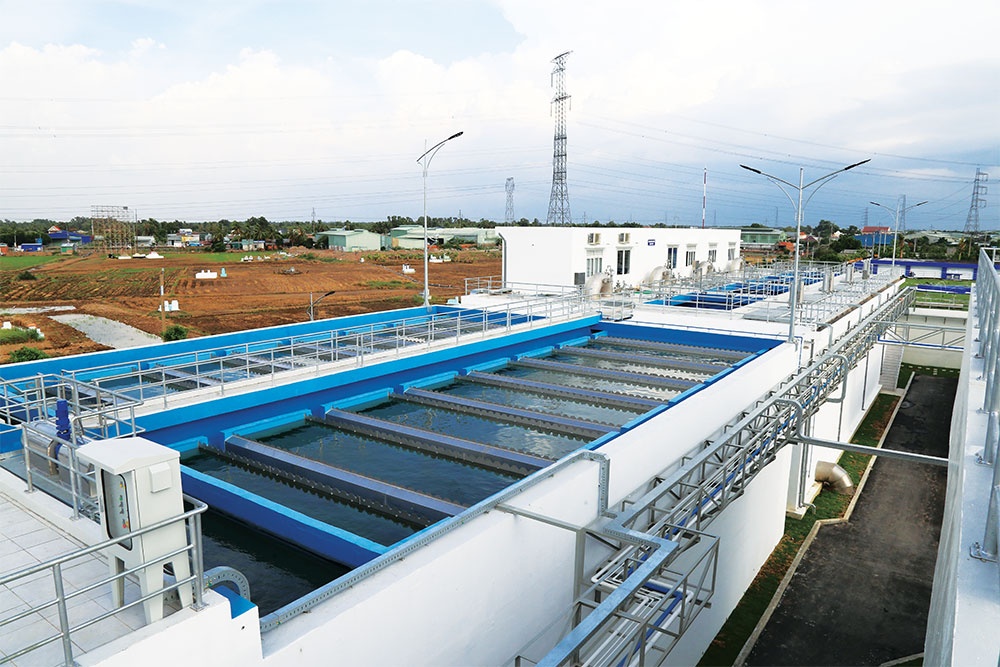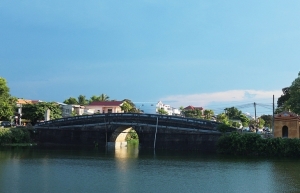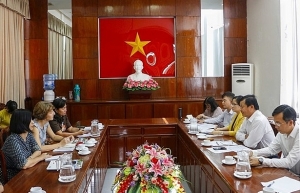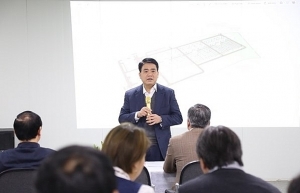Technology the answer for wastewater treatment
 |
| Technology the answer for wastewater treatment, illustration photo |
Nearly 20 Dutch businesses will visit Ho Chi Minh City on October 11-13 to participate in the 14th VietWater summit.
The event, which covers international water supply, sanitation, water resources, and purification, is deemed an ideal platform for exhibitors to showcase the most advanced products in water resource management, irrigation, urban water supply and drainage, and other water-related areas.
Kees van Baar, Ambassador of the Netherlands to Vietnam, said that the reason Dutch environmental technology and wastewater treatment businesses choose to come to Vietnam is because the two countries “speak the same language of water”.
“Our companies have a lot to offer. With state-of-the-art technology and expertise, we have the tools to tackle some of the toughest challenges while lowering the water and carbon footprint at the same time. This is important to meet our goals, but it is also important for those companies exporting to the EU, directly or as part of a supply chain,” said Baar.
Products that could be introduced by Dutch businesses include new technologies that help generate renewable energy from waste treatment, contributing to reducing production costs and input water consumption. In addition, some businesses also provide nano-filtration membrane solutions that affect the water filtration process, remove microplastics and pesticides, and decolorise wastewater.
The Netherlands is currently the biggest EU investor in Vietnam, with 60 per cent of all Vietnamese exports for the European market entering via the port of Rotterdam. This is also reflected in the fact that a significant number of companies from the water sector as well as waste treatment and environmental technology are already in Vietnam, Ambassador Baar said.
Overseas players interested
Stable economic growth, even through some globally tumultuous years, has made Vietnam an attractive destination for foreign businesses, according to the HSBC Global Connections report, unveiled in September. “Our research indicates that the country’s economic resilience and competitive wages (both 28 per cent) rank foremost in attracting international firms. The same percentage is attracted by Vietnam’s growing consumer market, highlighting the appeal of increasing consumer prosperity. The country’s growing digital economy (23 per cent) is also a key selling point for international business expansion,” the report highlights.
At the Ho Chi Minh City Socioeconomic Forum 2023 held last week, Han Sang Deog, deputy general director of Samsung Engineering Vietnam, said he has long been interested in considering investing in water treatment and waste to generate electricity in Vietnam.
“The company has proposed an integrated environmental complex strategy, which is a circular economy environmental complex including water, waste, and biogas treatment, using self-produced energy without using external energy sources,” he said.
According to Boon Teong Tee, general manager of Informa Markets Vietnam, 70 per cent of businesses participating in the VietWater exhibition next month will be foreign businesses, and this rate has doubled compared to a few years ago.
“Challenges in the water and environment industry after the pandemic have attracted foreign investors and businesses to Vietnam to transfer technology,” said Tee, whose company is the organiser of VietWater.
“Vietnam does not yet possess many self-invented technologies related to wastewater treatment, and Vietnamese businesses also have a need to continuously update new technology from the rest of the world, especially from countries such as the Netherlands, Australia, and France.”
Buyers’ need to update new technologies increases by 10 per cent every year, Tee added. “That is also a mandatory trend because businesses must ensure waste treatment before discharging into the environment according to the provisions of the Law on Environmental Protection 2020; otherwise they will be fined.”
Vietnam currently has about 50 centralised wastewater treatment plants with a capacity of one million cu.m per day and night, accounting for about 15 per cent of the rate of treated wastewater. By 2025, the country is expected to need $8.3 billion to provide drainage and wastewater treatment services for the needs of about 36 million urban residents, per information provided by the Ministry of Construction.
Limited system funding
Specialised seminars on water security have ramped up after global concerns were made about Japan’s discharge of some 7,800 tonnes of nuclear wastewater from the Fukushima plant into the Pacific Ocean in August. Discussions are centred around the development of new technology.
Minds also look back to the role of companies that have, in the past, been punished for illegally discharging waste. They include the Formosa Ha Tinh incident in 2016, after which Formosa had to spend billions of US dollars to resolve marine environmental pollution problems across four central provinces.
As recently as a fortnight ago, one agri-food company in the Mekong Delta province of Long An was fined for discharging wastewater into the environment in excess of regulations. However, in this case, the fine was a meagre VND30 million ($1,200).
Associate Prof. Dr. Hoang Thai Dai, senior expert from the Vietnam Irrigation Association, said Vietnam is facing water security, especially the problem of dealing with urgent issues related to water pollution, saltwater intrusion, and waste treatment policies.
“Vietnam has a rapid urbanisation rate, but economic conditions are still difficult, so investment in urban infrastructure systems, water supply and drainage systems, and wastewater treatment is still limited, especially in big cities like Hanoi and Ho Chi Minh City,” Dai assessed.
According to the Vietnam Water Supply and Sewerage Association, the rate of wastewater treated before being discharged into the environment is very low, of about 12 million cu.m of water discharged into the environment every day and night, only about 1.5 million cu.m is treated, the remainder is discharged directly into the environment.
In Ho Chi Minh City alone, the amount of wastewater generated from urban activities is estimated to be nearly 1.6 million cu.m per day, while in Hanoi, it is about 350,000-400,000cu.m.
Currently, water sources used for agricultural purposes account for more than 80 per cent of total water production in Vietnam. Besides agriculture, industrial activities are also one of the reasons causing serious water pollution. The impact of polluted water on people could reduce Vietnam’s GDP by about 3.5 per cent by 2035, according to the World Bank.
Vietnam is expected to achieve five out of 17 Sustainable Development Goals by 2030 and the country has set out a roadmap to improve the quality of water, industrial, agricultural and urban wastewater, and set treatment targets for all hazardous wastewater, increase the rate of urban wastewater treated to meet standards to half by 2030.
According to Ambassador Baar, it is critical for governments to offer the right incentives and regulations, and provide effective enforcement. The private sector contains the innovators with the technologies, knowledge, and expertise to address these challenges to achieve a sustainable and green transition.
“We can only solve these problems if government authorities, businesses, knowledge institutes, and civil society work together towards the same goal. An integrated approach is needed as the challenges of today are interconnected and intertwined,” he added.
 | French agency helps Hue in wastewater treatment project The Service public de l’assainissement francilien (SIAAP) of France will support Hue city, the central province of Thua Thien Hue, in a project to improve hydraulic system in river and research on sludge treatment. |
 | Can Tho to double capacity of German-funded wastewater treatment plant The Mekong Delta city of Can Tho is planning to double the capacity of its wastewater collection and treatment plant, which was partly funded by the German Development Bank (KfW), and considers this one of the investment priorities in the coming time. |
 | Hanoi’s leader urges completion of wastewater project Chairman of the Hanoi People’s Committee Nguyen Duc Chung has said he will no longer tolerate any delays to the construction of a wastewater treatment plant that is expected to address long-standing water pollution in the increasingly crowded city. |
What the stars mean:
★ Poor ★ ★ Promising ★★★ Good ★★★★ Very good ★★★★★ Exceptional
Related Contents
Latest News
More News
- SK Innovation-led consortium wins $2.3 billion LNG project in Nghe An (February 25, 2026 | 07:56)
- THACO opens $70 million manufacturing complex in Danang (February 25, 2026 | 07:54)
- Phu Quoc International Airport expansion approved to meet rising demand (February 24, 2026 | 10:00)
- Bac Giang International Logistics Centre faces land clearance barrier (February 24, 2026 | 08:00)
- Bright prospects abound in European investment (February 19, 2026 | 20:27)
- Internal strengths attest to commitment to progress (February 19, 2026 | 20:13)
- Vietnam, New Zealand seek level-up in ties (February 19, 2026 | 18:06)
- Untapped potential in relations with Indonesia (February 19, 2026 | 17:56)
- German strengths match Vietnamese aspirations (February 19, 2026 | 17:40)
- Kim Long Motor and AOJ Suzhou enter strategic partnership (February 16, 2026 | 13:27)

 Tag:
Tag:




















 Mobile Version
Mobile Version